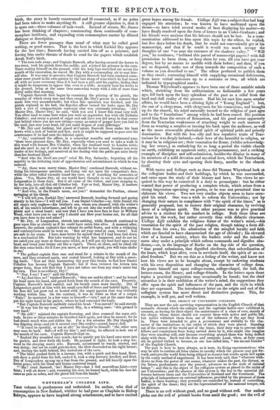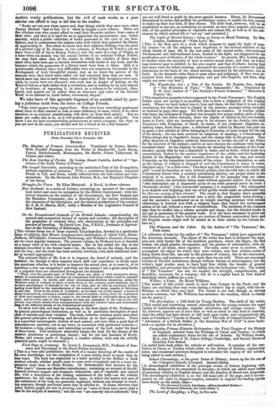WHITEHEAD'S COLLEGE LIFE.
THIS volume is posthumous and unfinished. Its author, who died of consumption in New Zealand, whither lie had gone as Chaplain to Bishop Selwyn, appears to have inspired strong attachments, and to have excited great hopes among his friends. College Life was a subject that had long engaged his attention ; he was known to have meditated upon the theme—to have tried several modes of best displaying his matter—to have finally resolved upon the form of letters to an Under-Graduate ; and his friends were anxious that his labours should not be lost. In a com- munication addressed to him upon this topic by the editor, he replied, but five days before his death, that he could not conveniently get at his manuscript, and that if he could it would too much occupy the thoughts of one " so near the entrance of the shadowy valley." "Will you," he continues, "befriend this parcel of manuscript papers ? with full permission to burn them, or keep them by you, till you have got your degree, but by no means to meddle with them before ; and then, if you are so disposed, make use of them towards the composition of such a volume as you described to me." The editor preferred to publish them as they stood ; contenting himself with supplying occasional deficiencies, from mere verbal omissions up to a sentence or two, all which are indicated by typographical marks.
Thomas Whytehead's appears to have been one of those amiable minds which, shrinking from the utilitarianism so fashionable a few years ago, fell back upon the hazy splendour of the past as a relief from the hard and dull reality of the present. Had his lot cast him upon secular affairs, he would have been a shining light of "Young England" ; but, the son of a clergyman, with clergymen for his connexions, and brought up for the church, his mind naturally turned to the religion of past ages and to the " foundations " among which he had been reared. His position saved him from the errors of Romanism, and his good sense apparently from the Tractarian weaknesses of attaching weight to such matters of form as wearing a surplice or turning his back upon the audience, as well as the more censurable pharisaical spirit of spiritual pride and priestly domination. But with the less silly and less repulsive traits of Trac- tarians he was deeply imbued,—their love of the beautiful in religion, or it may be in religious art; their veneration for Rome, (whilst acknowledg- ing her errors,) as embodying for so long a period the visible church on earth, exhibiting an apparent unity, a real permanency, and a striking example of discipline and self-submission, besides the display in many of its members of a mild devotion and mystical love, which the Tractarians, by shutting their eyes and opening their fancy, ascribe to the church itself.
With tastes and feelings such as these did Thomas Whytehead look at the collegiate bodies and their buildings, by which he was surrounded, and enter upon the study of their history and laws. The views he ac- quired in this way he conceived it a duty to promulgate : but he either wanted that power of producing a complete whole, which arises from a strong impression operating on genius, or he was not permitted time to elaborate his views. Two not very similar objects seem to have occu- pied his mind. One was a wish to reform the Universities; not by changing their nature in compliance with " the spirit of the times," as is generally proposed, but to restore their original character, by reviving more of a religious spirit. The other purpose was to give practical advice to a student for his conduct in college. Both these ideas are present in the work, but rather covertly than with didactic clearness. College Life exhibits the religious frame of the writer's mind,—his veneration for the spirit of the past religion, though taking a form dif- ferent from his own ; his admiration of the mingled loyalty and faith which are fancied to have characterized the age of chivalry; his elevated view of a learned society, where the leaders order and the subordi- nates obey under a principle which softens commands and dignifies obe- dienee,—or, in the language of Burke on the lay side of the question, "that proud submission, that dignified obedience, that subordination of the heart, which kept alive, even in servitude itself, the spirit of an ex- alted freedom." But we see this as a feeling of the writer, and know not how his views are to be brought about, except by endowing students with his own disposition and changing the character of college dons. He pours himself out upon college-rooms, college-chapel, the hall, the lecture-room, the library, and college-friends. In the letters upon these topics a practical suggestion may occasionally be found; but the chief attraction is in their exhibition of the writer's mind, the suggestions they offer upon the spirit and influences of the past, and the style in which they are expressed. The introductory letter on the origin and end of the collegiate system has more direct and distinctive purpose. This, for example, is well put, and well written.
THE OBJECT OF UNIVERSITY COLLEGES.
They are now the sole surviving representatives in the English Church of that monastic element which the colleges and the capitular bodies once exhibited in common, as having for their object the maintenance of a class of men, mainly of the clergy, whose duties should not connect them with active and public life, but rather withdraw them from out of the influence of the age they lived in. These were intended to give a permanence and stability to the cha- racter of the institutions in the midst of which they were placed. Standing out of the current of the world and of the times, their duty was to prevent their fellows and countrymen from being carried down by it, who might else imaaggiinnee they were standing still, only because everything around them was being drifted along with them. Such was the firm and energetic Laud, when, at forty years old, he quitted Oxford to become, as one has called him, " the second founder" of the English Church. The past is here to have always, as it were, its living representatives; who may be able to confute all false claims to novelty which the present may put for- ward, and save the world from being obliged to recover lost truths again and again, by the costly method of experiment. It has been truly said, that " whatever with- draws us from the power of our senses, whatever makes the past, the distant, or the future, predominate over the present, advances us in the scale of rational beings": and this is the object of the collegiate system as placed in the midst of our Universities; and the absence of this system is the key to the essential dif- ference between them and the Universities of Scotland and the Continent. The principle of independence on external influences, provided by the presence of these bodies, is there wanting; they generally are controlled by, instead of controlling, the spirit of the times; they are the representatives of the national temper, not its directors.
There is no evil without good, and no good without evil. Our author picks out the evil of printed books from amid the good ; not the evil of
Modern trashy publications, but the evil of such works as a poor gaoler can afford to buy to aid him in his studies.
" Books are not now those scarce and dear things which they once were, when George Herbert 'had to fast for it' when he bought a new volume. There are few scholars now who cannot afford to read their favourite authors from copies of their own: and thus it is hard for us to appreciate the preciousness, nay, rather sanctity, which a public collection of books possessed in the eyes of our fore- fathers, and in maseguence the jealous rules with which they ird ed the liberty Of approaching it. But when we know how that eighteen shillings was the price of a printed copy of St. Jerome, in two volumes, at Wynkyn de Verde's, (as we learn from a bill of his to Bishop Fisher,) and the same of a copy of Origen, at a time when six pounds was the annual income of an ordinary College Fellow, we may form some idea of the straits to which the scholars of those days must often have been pat to furnish themselves with books of any kind, and the treasure which the possession of a library must have been to them. Still, it is questionable whether these very difficulties were not sometimes favourable to the development of truly thoughtful minds; just as we know the powers of the memory were then much more called out and exercised than they are now. It would seem too, that in early times, when copies of the Holy Scriptures were rare, while its truths were not obscured, men were less in danger of looking on the Word of God as a book rather than a revelation, and so holding by its text instead of its doctrines; of regarding it, in :Mort, as a volume to be criticised, illus- trated, and argued out of, rather than an utterance and voice of the Eternal Word, to be listened to, knelt before, reverenced, obeyed."
We take leave of this agreeable fragment of an amiable mind by quot- ing a judicious truth from the letter on College Friends.
"Take heed against being supercilious. Most men have something unpleasant about them in their manner or look, or some deficiency in taste, which, if we allow ourselves in an extreme sensitiveness, will drive us from their society. But we must not suffer this to be, as it will produce self-isolation and self-pride. You know I am not here recommending promiscuous or much company, but that, as you are now in the mine, you should seek for a friend as for a hid treasure."



























 Previous page
Previous page